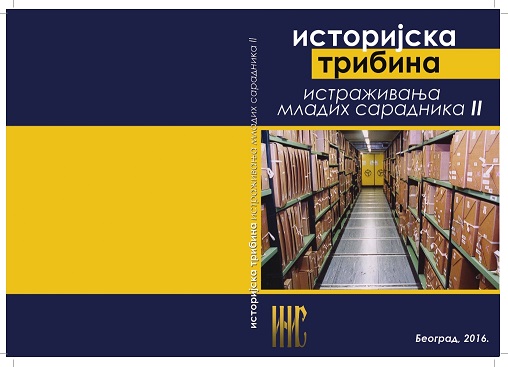Југословенски комунисти и српско питање у народнофронтовској фази (1935–1941)
Yugoslav Communists and Serbian Question in the Time of Popular Front (1935–1945)
Author(s): Dušan Vojković
Subject(s): Political history, Interwar Period (1920 - 1939), History of Communism, Inter-Ethnic Relations, Sociology of Politics, Politics and Identity
Published by: Institut za noviju istoriju Srbije
Keywords: The Communist Party of Yugoslavia; nations; Serbs; Serbia; the great Serbian hegemony; self-determination;
Summary/Abstract: Nationality policy of the Communist Party of Yugoslavia during the inter-war period was, among other things, marked by numerous dilemmas and frictions among the Yugoslav communists, inconsistency in implementing decisions of the Party leadership, by frequent changes in treatment of various Yugoslav peoples and national minorities, misunderstanding and diverging from the official Commintern line. In the process of building the Kingdom of the Serbs, Croats and Slovenes, the Yugoslav communists first saw national liberation of the single people „with three tribes“, i.e. „with three names“. However, under strong pressure from Moscow in early 1920s the idea of ethnic originality of the Serbs, Croats and Slovenes was adopted. The Macedonian question was opened in 1922, whereas the right to self-determination was recognized to the Montenegrin population in 1928. The relation of the Yugoslav communists toward the Serbian people and Serbia during the first years of the Popular Front (1935– 1938) was based on the views the Commintern and the CPY had previously adopted that saw the Yugoslav state as the creation of the Versailles Peace Treaty and called for toppling of the „greater Serbian military-fascist dictatorship“. The CPY rhetoric branded the Serbian people the strongest hegemonistic element in the country that oppressed and exploited other peoples and national minorities. Since March 1938, parallel with the enlargement of German borders, the Party leadership worked more actively for preservation of the territorial integrity of the Yugoslav community. At the same time, almost all problems that could further endanger the already chipped state unity were pushed to the back burner. During this period (1938– 1941) somewhat milder attitude toward the Serbs and Serbia prevailed within the CPY. On the other hand, the official Party documents testify that deep ingrained stereotypes of two decades before died hard. The Serbian question was not definitively solved during the inter-war period. Also, the leadership of the CPY tacitly refused to define the territory of Serbia and the rights of the Serbian people.
Book: Историјска трибина. Истраживања младих сарадника Института за новију историју Србије (II)
- Page Range: 11-37
- Page Count: 27
- Publication Year: 2016
- Language: Serbian
- Content File-PDF

